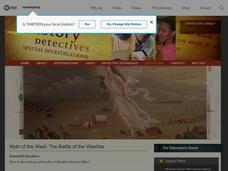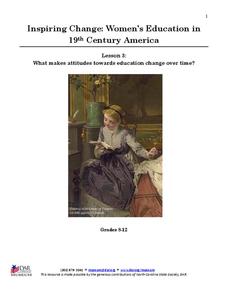University of California
The Civil War: Lincoln’s Speeches
Abraham Lincoln is responsible for uniting the states during the most tumultuous periods in American history, and for his elegant oratory that kept the Union believing in its cause. Young histoians analyze various speeches by America's...
Facing History and Ourselves
Kristallnacht: Decision-Making in Times of Injustice
Have you ever been singled out in a crowd before? Pupils investigate and analyze the events of the Holocaust. They dive into the life of a middle school student, as well as the diary entries of those in Kristallnacht during World War II.
PBS
Abraham Lincoln: Man versus Legend
Abraham Lincoln was one of the greatest presidents ever ... right? Scholars research the accomplishments and struggles of the Lincoln presidency. They uncover facts, materials and information via video clips, primary, and secondary...
PBS
Myth of the West: Lonely But Free I’ll Be Found
Tumbling tumbleweeds! Scholars work with video clips, primary and secondary documents, and song lyrics to uncover life in the Old West. They examine song's lyrics to uncover myths told in the 1930s about life in the Wild West.
PBS
Family History: On Your Honor
What is your history? Scholars work with their own families to create a unique story of the courage and bravery of their ancestors. The third and final part of the series culminates in a creation of not just a family history, but a...
PBS
Family History: Treasure Troves
It's time for show and tell! Scholars investigate historical artifacts to determine what secrets they reveal about the time periods they represent. They then research their own personal artifacts, as well as those from World War I.
PBS
Civil War: Before the War
Free the slaves! Scholars research primary documents and videos while working together to create abolitionist posters. They examine the John Brown raid as a template to creating their own demonstration.
US Institute of Peace
Peacebuilders in Action
What contributions have great peacebuilders made to our society? Civic-minded scholars take an in-depth look at people who have made a difference world-wide during the 12th lesson in a 15-part series. After researching facts about their...
National History Day
Challenging the Status Quo: Women in the World War I Military
Why are some so resistant to change? The status quo is often to blame for a lack of forward movement in society. Following the events of World War I, women in America suddenly had a voice—and were going to use it. Scholars use the second...
PBS
Using Primary Sources: The Rogue's Gallery
What would be in your life's scrapbook? Scholars use short video clips, primary and secondary documents, and photos to investigate a 1909 scrapbook. They analyze and uncover what the Rogue Book tells them about the past in Western...
PBS
Using Primary Sources: Nazi Spy Ring Busted
Spy games are not just for professionals anymore! Scholars use short video clips, primary documents, and photographs to investigate Nazi spies in America during World War II. The young detectives analyze the paranoia warfare can create...
PBS
Myth of the West: The Battle of the Washita
Go West, young man! Scholars use PBS video clips, slide shows, and interactive materials to create a picture of Manifest Destiny in the American West. Using a variety of primary and secondary sources, young historians learn about the...
PBS
Family History: Those with Lofty Ideals
Would you stand up for your beliefs, no matter the cost? Scholars investigate their own families to uncover examples of how and when someone stood up for their ideals. Using video clips, interviews, and eulogies, they come to understand...
PBS
Civil War: Blacks on the Battlefield
Imagine a war being fought to free slaves, with slaves on the front line. Scholars use primary documents, videos, and research in the second installment of a three-part series to guide their analysis of the first African-Americans on the...
PBS
Evaluating Conflicting Evidence: Sultana
What sunk the Sultana? Scholars become investigators to uncover the facts behind the 1865 sinking just after the end of the Civil War. Through group work, videos, and primary documents, they research and analyze why 1,800 men died....
PBS
Think Like a Historian: A Viewing Guide
Calling all junior detectives! Scholars use the tools of investigation to determine the causes and impacts of the American Civil War. Using viewing guides, videos, group research, and written resources, they discover what it takes to...
National History Day
How Did the Food Administration Convince Americans to Make Sacrifices during World War I?
During American's involvemnt in World War I, citizens on the home front became directly involved in the war effort. Scholars uncover just how Americans helped the war an ocean away with primary documents, investigative skills, and...
National History Day
Why Did the United States Enter World War I in 1917?
World War I was the first major conflict on a global scale. Using primary documents, learners determine why the United States chose to enter World War I when it did. After analytical writing and group research, the causes of America's...
National Endowment for the Humanities
Women's Lives Before the Civil War
Women's lifestyles before the Civil War made a huge impact as a point of causation. Give middle schoolers the opportunity to view firsthand the lives of women before the Civil War. They analyze primary source documents, view photographs,...
National Endowment for the Humanities
Life Before the Civil War
American life before the Civil War was very different from American life today. To show this difference in a full spectrum, learners compare two communities that illustrate the differences between Northern and Southern life. Throughout...
National Endowment for the Humanities
A Debate Against Slavery
Slavery is a serious topic that can be challenging for middle schoolers to study. Young scholars can see firsthand through primary sources what occurred during that time period in the United States. The third of five lessons provides...
National Endowment for the Humanities
George Washington: The Precedent President
Everyone knows that George Washington was the first president, but do your scholars know why that was so important? The lesson plan, the third in a sequence of three, allows learners to understand how George Washington set a precedent...
Broadway GPS
ALADDIN: Broadway's New Musical Comedy
Aladdin, Disney's Broadway musical comedy, is a magic carpet ride. Prepare your class for a field trip to the show with a study guide that is a treasure trove of activities, cultural connections, and background information.
National Society Daughters of the American Revolution
Lesson 3: What Makes Attitudes Towards Education Change over Time?
The struggle for women's rights is not unique to this generation, or even to the 20th century. Class members explore the conflicting opinions of Alexander Graham Bell and his wife, Mabel Hubbard Bell, regarding women's pursuits of higher...

























